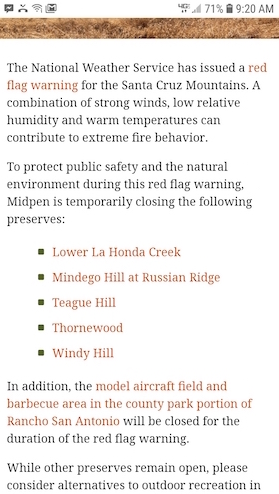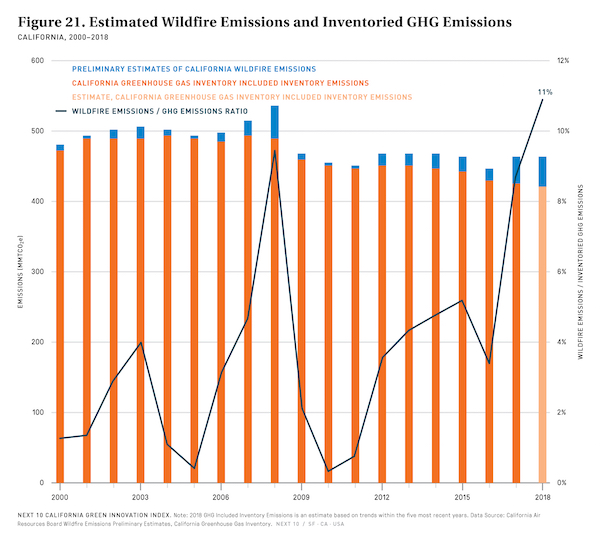So -- what did you learn last week, from hearing about the power shutoffs, or anticipating one, or directly experiencing one? Did you make any decisions or take any actions for the future that you wouldn’t have otherwise? Do you understand something better now?
If you are wondering whether PG&E learned anything, look for their Public Safety Power Shutoff (PSPS) report, which should appear in two weeks or so. They are required to publish one within ten business days of an event, and it may be interesting reading. For a recent example, take a look at the report PG&E filed for the late September shutoffs in the Sierra foothills and North Bay, which can be found here. Much of it reads like a giant weather report, but some of the interesting parts to me are:
- Damage (page 23). Before the utility can turn power back on, they examine all the power lines that were turned off to make sure they are safe to re-energize. When they do this, they document (and fix) any damage they see on the lines. You will find photos in this section.
- Complaints and Claims (page 48). You can review the complaints and claims that resulted from the outage. I can imagine there will be more than three complaints this time around...
- Lessons Learned (page 59). They document the lessons they learned from the process. It sounds like communication and re-energization speed have been areas of recent improvement. But I was also interested to read that they found inviting visitors to the decision-making meeting (on de-energizing) to be productive, and they plan to expand that.
I’d say that reading this report makes you realize that these shutoffs are a pretty significant undertaking.
FWIW, the other big investor-owned utilities in the state (Southern California Edison and San Diego Gas and Electric) are also doing these shutoffs and writing reports. Some of those can be found on the CPUC De-Energization page.
So what lessons did we residents learn? Here are a few things that I learned from the planned outage.
1. The area right around the Bay is less vulnerable to outages. I was pleasantly surprised that PG&E was able to isolate the area around the bay, including San Jose and San Francisco and many large businesses, from the outage. Not just in theory (the map they offered) but also in practice (they hadn’t done this before). Count that as a plus of living in a densely populated area.

2. The outrage was manifest. I was surprised by the degree of anger directed towards PG&E, particularly given we all have experienced the fires recently. I wonder how much of this stems from general distrust of PG&E vs a specific disagreement with the process.
3. There is no substitute for real-world practice. The IT department of a big tech company where I used to work would simulate major outages on a regular basis. Would services stay operational? Could employees maintain adequate levels of communication? Were there any cascading failures? And so forth. A silver lining of these PSPS outages is we all become less vulnerable to future outages, which may not always be planned. PG&E at least learned that its website needs to support higher loads...
4. Several local parks were closed. It surprised me that the Mid-Peninsula Open Space District closed several parks. Is that a new thing?

Anyway, I’m curious what, if anything, you took away from last week’s events. (And if you want to include the Home Electrification Expo as an event from last week, any thoughts on what you saw or heard there would be interesting!)
Current Climate Data (August/September 2019)
Global impacts, US impacts, CO2 metric, Climate dashboard (updated annually)
Comment Guidelines
I hope that your contributions will be an important part of this blog. To keep the discussion productive, please adhere to these guidelines, or your comment may be moderated:
- Avoid disrespectful, disparaging, snide, angry, or ad hominem comments.
- Stay fact-based, and provide references (esp links) as helpful.
- Stay on topic.
- In general, maintain this as a welcoming space for all readers.




